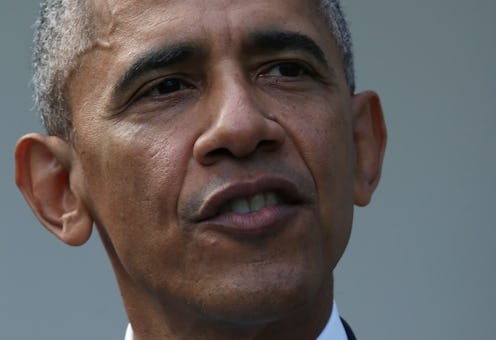News
Obama: Dems Must Reject Cynicism To Survive
I didn’t cry Tuesday night. I didn’t cry Wednesday morning when I watched president-elect Donald Trump’s victory speech (I keep saying it in the hopes that the shock will wear off… it hasn’t yet). I did cry when Hillary Clinton, in her morning-after speech, choked up while saying “To all the women… who put their faith in this campaign and in me: I want you to know that nothing has made me prouder than to be your champion.”
But the most important message Wednesday morning, to my mind, came from President Barack Obama: “To the young people who got into politics for the first time and may be disappointed by the results, I just want you to know, you have to stay encouraged. Don't get cynical, don't ever think you can't make a difference. As Secretary Clinton said this morning, fighting for what is right is worth it.”
This is more than just a call for people on the left to keep up the fight after this (frankly devastating) blow, it’s an insight into one of the key components of liberal politics: I believe cynicism is what fuels the conservative movement and Republican politics, but it’s kryptonite to the Democrats and the left.
This distinction is going to be crucial as the Democratic party and the left tries to forge its next chapter in American politics. Because, to a certain extent, I believe the GOP is allowed to divorce its tactics and policies from its principles (someone, please explain to me how a follower of Jesus Christ can support repealing a law that helps people get medicine, or refuses shelter to refugees fleeing war-torn nations). Their cynicism about politics and government is built into their approach to it: because they want government to do less, all they have to do is drag their heels.
But for people on the left, cynicism has a much darker effect: if you stop believing in the cause, in the idea that government can be an effective and helpful tool for people, the instinct is to retract from it, to go do something else. Even for me, as someone who is less directly associated with politics than actual politicians, engaging with the process and the dialogue today is immensely difficult. How can I work towards a system where even though my candidate was backed by more people, she got shut out? All I want to do is disengage.
Of course, that’s what Obama’s message was all about — staying away from negativity and continuing to strive towards hope and progress. And while those people already in the Democratic party — especially the Senate — have their work cut out for them for the next several years, it’s the next generation of potential politicians that need to believe they can effect change. Without that fuel of enthusiasm — which Obama had in spades, and which Clinton always struggled with — getting over the finish line will always be a harder battle than it should be.
